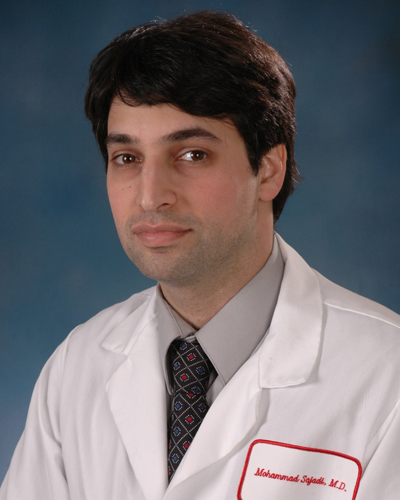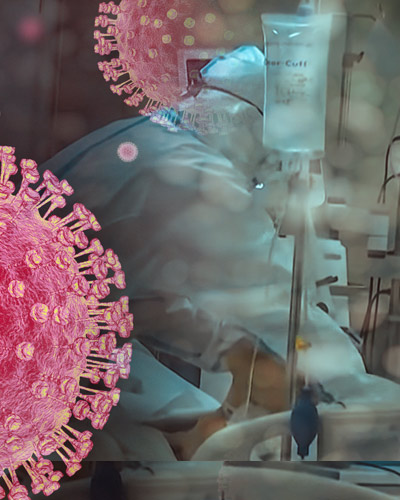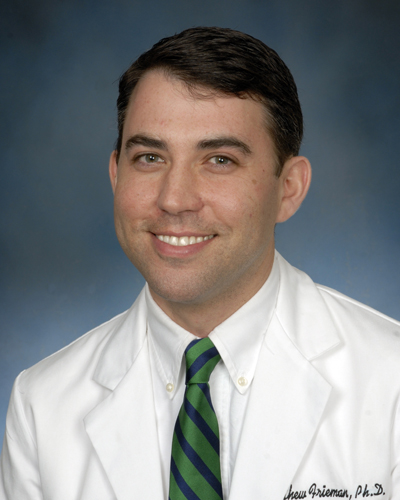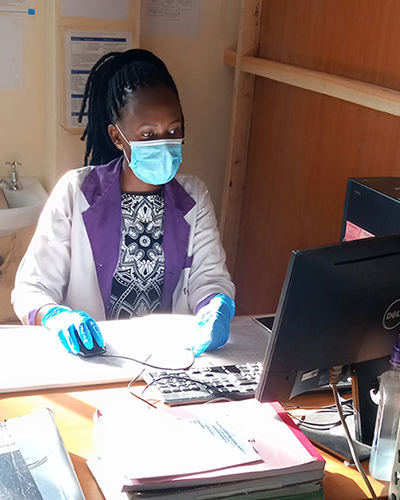December 22, 2020 | Deborah Kotz

Important New Findings from UM School of Medicine Could Help Guide Healthcare Clinicians with Managing Patients in the Weeks Ahead
Hospitalized COVID-19 patients have a greater risk of dying if they are men or if they are obese or have complications from diabetes or hypertension, according to a new study conducted by University of Maryland School of Medicine (UMSOM) researchers. In a study published in the journal Clinical Infectious Diseases, the researchers evaluated nearly 67,000 hospitalized COVID-19 patients in 613 hospitals across the country to determine the link between certain common patient characteristics and the risk of dying from COVID-19.
Their analysis found that men had a 30 percent higher risk of dying compared to women of the same age and health status. Hospitalized patients who were obese, had hypertension or poorly managed diabetes had a higher risk of dying compared to those who did not have these conditions. Those aged 20 to 39 with these conditions had the biggest difference in their risk of dying compared to their healthier peers.
“Predicting which hospitalized COVID-19 patients have the highest risk of dying has taken on urgent importance as cases and hospitalizations in the U.S. continue to surge to record high numbers during the month of December,” said study corresponding author Anthony D. Harris, MD, MPH, Professor of Epidemiology and Public Health at UMSOM. “Knowledge is power in many ways, so I think understanding which hospitalized COVID-19 patients are at highest risk of mortality can help guide difficult treatment decisions.”
For example, higher-risk patients may be given the drug remdesivir earlier in their hospitalization to help prevent severe complications or may be considered for closer monitoring or ICU admission. Healthcare providers may also want to consider these risks when determining which COVID-19 patients could benefit the most from the new monoclonal antibody therapies that, if given in the first few days of the infection, can reduce the risk of hospitalization.
Age remained the strongest predictor of mortality from COVID-19. Overall, nearly 19 percent of hospitalized COVID-19 patients died from their infection with the lowest mortality among pediatric patients, which was less than 2 percent. Mortality rates increased with each decade of life with the highest mortality, 34 percent, among those aged 80 and older.
 “Older patients still have the highest risk of dying, but younger patients with obesity or hypertension have the highest risk of dying relative to other patients their age without these conditions,” said study lead author Katherine E. Goodman, JD, PhD, a postdoctoral fellow in the Department of Epidemiology and Public Health at UMSOM. “Doctors may want to be paying extra attention to these younger patients when they’re hospitalized to ensure they detect any complications quickly.”
“Older patients still have the highest risk of dying, but younger patients with obesity or hypertension have the highest risk of dying relative to other patients their age without these conditions,” said study lead author Katherine E. Goodman, JD, PhD, a postdoctoral fellow in the Department of Epidemiology and Public Health at UMSOM. “Doctors may want to be paying extra attention to these younger patients when they’re hospitalized to ensure they detect any complications quickly.”
The researchers also found some good news in their study findings. Death rates among hospitalized patients have fallen dramatically since the early weeks of the pandemic in April. This is likely due to the availability of new treatments and more knowledge in the medical community on how to properly manage and care for hospitalized patients.
“As we head into what may be the darkest weeks of the pandemic, it is reassuring to know that our researchers are continuing to make important advances that could help guide the decision-making skills of healthcare workers in the field,” said E. Albert Reece, MD, PhD, MBA, Executive Vice President for Medical Affairs, UM Baltimore, and the John Z. and Akiko K. Bowers Distinguished Professor and Dean, University of Maryland School of Medicine. "I am incredibly proud of our faculty and what they have accomplished to help save the lives of COVID-19 patients as we eagerly await a vaccine.”
About the University of Maryland School of Medicine
Now in its third century, the University of Maryland School of Medicine was chartered in 1807 as the first public medical school in the United States. It continues today as one of the fastest growing, top-tier biomedical research enterprises in the world -- with 45 academic departments, centers, institutes, and programs; and a faculty of more than 3,000 physicians, scientists, and allied health professionals, including members of the National Academy of Medicine and the National Academy of Sciences, and a distinguished two-time winner of the Albert E. Lasker Award in Medical Research. With an operating budget of more than $1.2 billion, the School of Medicine works closely in partnership with the University of Maryland Medical Center and Medical System to provide research-intensive, academic and clinically-based care for nearly 2 million patients each year. The School of Medicine has more than $563 million in extramural funding, with most of its academic departments highly ranked among all medical schools in the nation in research funding. As one of the seven professional schools that make up the University of Maryland, Baltimore campus, the School of Medicine has a total population of nearly 9,000 faculty and staff, including 2,500 student trainees, residents, and fellows. The combined School of Medicine and Medical System (“University of Maryland Medicine”) has an annual budget of nearly $6 billion and an economic impact more than $15 billion on the state and local community. The School of Medicine, which ranks as the 8th highest among public medical schools in research productivity, is an innovator in translational medicine, with 600 active patents and 24 start-up companies. The School of Medicine works locally, nationally, and globally, with research and treatment facilities in 36 countries around the world. Visit medschool.umaryland.edu
Contact
Office of Public Affairs
655 West Baltimore Street
Bressler Research Building 14-002
Baltimore, Maryland 21201-1559
Contact Media Relations
(410) 706-5260
Related stories

Monday, February 02, 2026
University of Maryland School of Medicine Launches Clinical Trial of Investigative Nasal Spray Medicine to Prevent Illnesses from Respiratory Viruses
Last year, at least one million people in the U.S. were hospitalized for respiratory virus illnesses like the flu or COVID-19, according to the Centers for Disease Control and Prevention. Many of these individuals were at higher risk of getting infections due to living or working around young children who contract more respiratory infections. A new clinical trial led by researchers at the University of Maryland School of Medicine’s (UMSOM) Center for Vaccine Development and Global Health (CVD) will test a new experimental intranasal spray designed to boost immune defenses and reduce illness from respiratory viruses.

Wednesday, March 20, 2024
New Study Reveals Insights into Lack of Durability in COVID Antibody Response to Infections & Vaccines
Researchers at the Institute of Human Virology (IHV) at the University of Maryland School of Medicine published a new study in the Journal of Infectious Diseases investigating the short-lived antibody response following SARS-CoV-2, the virus that causes COVID.

Thursday, October 12, 2023
UM School of Medicine Researchers Provide First Statewide Prevalence Data on Two New Emerging Pathogens in Healthcare Settings
University of Maryland School of Medicine (UMSOM) researchers conducted a statewide survey of all patients on breathing machines in hospitals and long-term care facilities and found that a significant percentage of them harbored two pathogens known to be life-threatening in those with compromised immune systems. One pathogen, Acinetobacter baumannii, was identified in nearly 31 percent of all patients on ventilators to assist with their breathing; Candida auris was identified in nearly 7 percent of patients on ventilators, according to the study which was published today in the Journal of the American Medical Association.

Monday, August 07, 2023
AI Transformation of Medicine: Why Doctors Are Not Prepared
As artificial intelligence systems like ChatGPT find their way into everyday use, physicians will start to see these tools incorporated into their clinical practice to help them make important decisions on diagnosis and treatment of common medical conditions. These tools, called clinical decision support (CDS) algorithms, can be enormously helpful in helping guide health care providers in determining, for example, which antibiotics to prescribe or whether to recommend a risky heart surgery.

Tuesday, May 11, 2021
New Study Suggests Pregnant Women Hospitalized for Covid-19 Infection Do Not Face Increased Risk of Death
Pregnant women who develop severe COVID-19 infections that require hospitalization for pneumonia and other complications may not be more likely to die from these infections than non-pregnant women. In fact, they may have significantly lower death rates than their non-pregnant counterparts. That is the finding of a new study published today in the Annals of Internal Medicine conducted by researchers at the University of Maryland School of Medicine (UMSOM).

Monday, March 29, 2021
Cancer Drug Lessens the Toxicity of a Protein from the Virus that Causes Covid-19, UM School of Medicine Study Finds
University of Maryland School of Medicine (UMSOM) researchers have identified the most toxic proteins made by SARS-COV-2—the virus that causes COVID-19 – and then used an FDA-approved cancer drug to blunt the viral protein’s detrimental effects. In their experiments in fruit flies and human cell lines, the team discovered the cell process that the virus hijacks, illuminating new potential candidate drugs that could be tested for treating severe COVID-19 disease patients. Their findings were published in two studies simultaneously on March 25 in Cell & Bioscience, a Springer Nature journal.

Tuesday, March 16, 2021
New Study Finds Healthcare Settings Do Not Pose Added Risk Factor for Covid-19 Infection Spread Among U.S. Healthcare Personnel
Healthcare personnel who were infected with COVID-19 faced stronger risk factors outside of the workplace than in their hospital or healthcare settings. That is the finding of a new study published today in the Journal of the American Medical association's JAMA Network Open conducted by University of Maryland School of Medicine (UMSOM) researchers and colleagues at the Centers for Disease Control and Prevention (CDC) and three other universities.

Thursday, January 21, 2021
UM School of Medicine Hosted Media Availability for Ensuring Trust in COVID-19 Vaccine Event
On January 22, 2021 at 2 p.m., the University of Maryland School of Medicine (UMSOM) hosted Black faith-based leaders, COVID-19 research volunteers, and “America’s Doctor,” Anthony Fauci, MD. The event provided straight talk about fears, trust issues, and why we need our Black and Brown community to be a part of COVID-19 vaccine research.

Thursday, October 22, 2020
New Landmark Study at UM School of Medicine Finds Aspirin Use Reduces Risk of Death in Hospitalized COVID-19 Patients
Hospitalized COVID-19 patients who were taking a daily low-dose aspirin to protect against cardiovascular disease had a significantly lower risk of complications and death compared to those who were not taking aspirin, according to a new study led by researchers at the University of Maryland School of Medicine (UMSOM). Aspirin takers were less likely to be placed in the intensive care unit (ICU) or hooked up to a mechanical ventilator, and they were more likely to survive the infection compared to hospitalized patients who were not taking aspirin, The study, published today in the journal Anesthesia and Analgesia, provides “cautious optimism,” the researchers say, for an inexpensive, accessible medication with a well-known safety profile that could help prevent severe complications.

Monday, August 17, 2020
UMSOM’s Department of Epidemiology and Public Health Center of Excellence in Infection Control Awarded CDC Funds for COVID-19 Research
The Department of Epidemiology and Public Health (EPH) at the University of Maryland School of Medicine was recently awarded $900,000 for COVID-19 research from the Centers for Disease Control and Prevention (CDC). The funding will be used by faculty in the Department’s Division of Genomic Epidemiology and Clinical Outcomes for research to help identify the most effective measures for COVID-19 infection control in healthcare settings.

Tuesday, June 16, 2020
UM School of Medicine Researchers Receive Federal Funding to Rapidly Test New Treatments for COVID-19
Researchers at the University of Maryland School of Medicine (UMSOM) will be partnering on an agreement funded by the federal government’s Defense Advanced Research Projects Agency (DARPA) to rapidly test hundreds of drugs, approved and marketed for other conditions, to see whether any can be repurposed to prevent or treat COVID-19. The compounds will be tested in studies using state-of-the-art technologies in the laboratory of coronavirus researcher Matthew Frieman, PhD., Associate Professor of Microbiology and Immunology at the University of Maryland School of Medicine. UMSOM will receive up to $3.6 million over the next year to fund this effort.

Monday, June 15, 2020
UM School of Medicine Researchers Help Identify Potent Antibody Cocktail with Potential to Treat COVID-19
Researchers at the University of Maryland School of Medicine (UMSOM) evaluated several human antibodies to determine the most potent combination to be mixed in a cocktail and used as a promising anti-viral therapy against the virus that causes COVID-19. Their research, conducted in collaboration with scientists at Regeneron Pharmaceuticals, was published today in the journal Science. The study demonstrates the rapid process of isolating, testing and mass-producing antibody therapies against any infectious disease by using both genetically engineered mice and plasma from recovered COVID-19 patients.

Tuesday, June 02, 2020
UM School of Medicine’s Institute of Human Virology Awarded Grants to Strengthen COVID-19 Response in Sub-Saharan Africa
The Center for International Health, Education and Biosecurity (Ciheb) at the University of Maryland School of Medicine’s Institute of Human Virology was awarded $4 million from the U.S. Centers for Disease Control and Prevention (CDC) to support coronavirus disease 2019 (COVID-19) response activities in Botswana, Nigeria, Malawi, and Mozambique.
